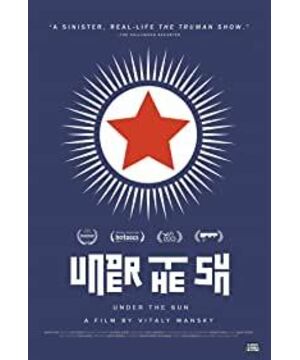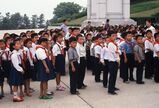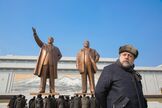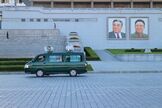A very good documentary, the choice of lens language and perspective is very good: from the perspective of a seemingly ordinary but extraordinary girl in the capital, to examine the gloomy, cold, empty streets and public offices in Pyongyang" The stereotyped life of a public family. While most of the footage was strictly selected under official constraints, and many scenes were staged, after dramatization, editing, and reorganization, the rambling photography tidbits instead presented a very real character in the hard, icy city of Pyongyang. On the one hand, especially the tidbits of the posing process and the official re-setting of the characters are collaged into a serious and clear feature film plot with a critical standpoint. The irony in the shots is very impressive.
What makes people throbbing is the fatigue, routine and occasional "trance" moments that are constantly interspersed between the rehearsal of the grand ceremony, such as the finger-playing girl in the group when the female teacher talks about the "great deeds" of the Kims and his sons in class. , a girl with an indifferent and pale face, who does not participate in the discussions of other classmates; a girl covered in medals and a veteran who dozed off while telling the story of her military service in the auditorium; the protagonist Xin Mei's performative smile and forbearance of tears during dance practice; Xin Mei at home Moments of dazedly looking out at the square from the window, scribbling aimlessly with hands; Xinmei's parents, their expressionless, solemn faces, as if to reveal the suffocating anguish and boredom of this country, and the kind of routine Fit and indifferent adult wisdom.
At the end of the film, the heroine Xin Mei faces the camera and weeps silently. Ironically, she seems to have been incorporated into the state system from birth, becoming a signifier in the huge symbolic signifier that completes the state. She rarely experiences happiness. When the photographer asked her to talk about something that made her happy, she couldn't find it, but recited the oath she swore when she joined the Youth League. Her tone, familiar from the repeated recitation of this oath, has a taste of carefully polished political lyricism, internalized in language and thought patterns, but not lyrical. At last her face calmed down, returning to her usual serious indifference, waiting for those stereotyped moments in life that required rehearsals. She seemed to have entered gray adulthood very quickly, and had a very quick insight into her destiny in this rigid eastern city.
The symbolic elements in the shots are almost punctures that flash into the narrow subject matter given by the official, and they "legitimately" show the character and temperament of this country in subtle ways. I don’t know if it’s dusk or morning, a long shot of citizens pushing the “stranded” socialist trolleybus silently; a bus stop lined up loosely after a large political dance in the evening; the dark and dark subway tunnels in Pyongyang; the streets of Pyongyang at dawn and dusk Empty high-rise residential buildings without lights; public officials cleaning flowers on the leader's memorial platform every day... These cities' expressions reflect the indifference and exhaustion of Xin Mei's family, and now they understand that as an atom that shapes the country's mythology, their The whole life is wrapped under the powerful pressure of macro-architecture, implicit or explicit - their inner being is evacuated, leaving only the dazedness, emptiness and boredom after losing their self-focus.
This documentary is different from the previous North Korean-themed documentaries, or the dramatic display of the existing "politically correct" discourse, or the exaggerated exaggeration of North Korean people, things and things with a suspiciously sad color. It upholds a fair and moral conscience and explores how people in the context are both constrained by the grand state machine in which they live, and unable to escape their true inner state of mind— —Such a kind of survival potential energy that plays games, contradicts and rebalances in the dynamic. The documentary captures people's amazing perseverance in maintaining internal balance in the torn between two forces very delicately. The subtle wrinkling of the soul is only seen in children who are still immature, although the protagonist of the story has shown very calmness. restrained. Rationality always overcomes the inherent crux of unhealthy, inappropriate, and incompatible with the majesty of macro-architecture, but from the perspective of the entire film, almost without exception, the innocent faces shot by the film all reveal some kind of uninterrupted reason. The panic, helplessness, dazedness, and callousness that are accustomed to acting out of life.
When life becomes a drama, all daily work and daily life can be incorporated into the camera of the national system, and people's self-performance in life may also be internalized into a routine national character. This documentary provides a good example of how to still make a stand-up auteur film with limited external conditions, rather than complaining about the deficiencies of various objective shooting conditions like some crappy director. Maybe just a small thought and a small arrangement can make a large lump of objects move, which is really the director's talent and ingenuity; and this talent is like moving a mirror, so It is empowered by genuine humanitarianism, concern for the fate of the human being as a whole, and consideration for the fate of individuals.
2017/9/11 Northeast Shanghai
View more about Under the Sun reviews







